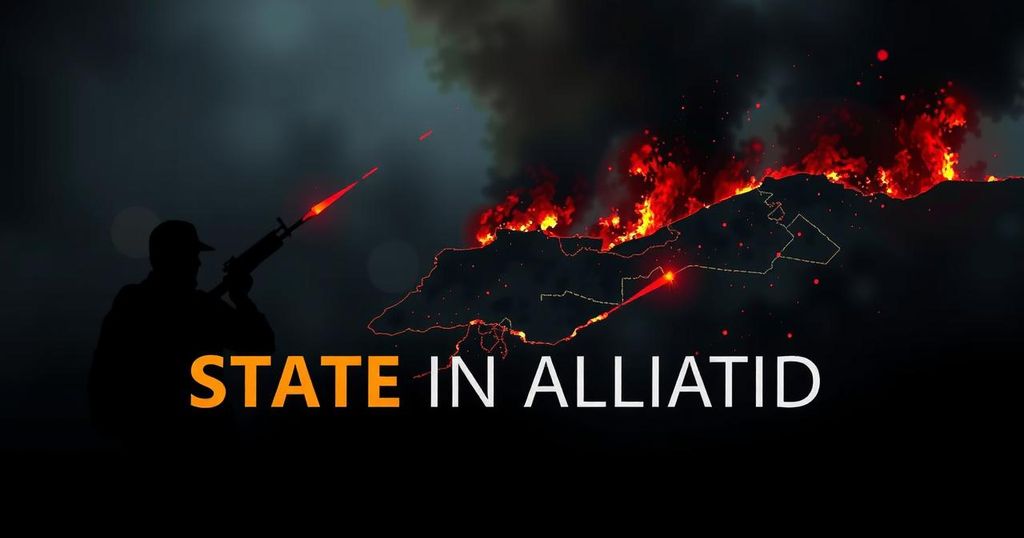Egypt Proposes Two-Day Truce in Gaza Amidst Escalating Violence
Egypt has proposed a two-day ceasefire in Gaza to enable a limited exchange of Israeli hostages for Palestinian prisoners amidst ongoing violence that has claimed thousands of lives. Negotiations involving key international players aim to reduce hostilities further. The humanitarian situation remains dire, particularly in northern Gaza, where the United Nations has condemned the living conditions of civilians. As airstrikes escalate, solutions become urgently needed to address the crisis.
In a significant development concerning the ongoing conflict in Gaza, Egyptian President Abdel Fattah al-Sisi proposed a two-day truce aimed at facilitating a limited exchange of hostages and prisoners. This announcement comes in the wake of intensified Israeli airstrikes which reportedly resulted in the deaths of 45 Palestinians on a single day within the enclave. The proposal aims to exchange four Israeli hostages held by Hamas for a number of Palestinian prisoners, fostering hope for a cessation of hostilities. At a press conference in Cairo, alongside Algerian President Abdelmadjid Tebboune, President Sisi indicated that negotiations to establish a lasting ceasefire should resume within ten days following the initial truce. While there has been no immediate response from Israel or Hamas regarding this proposal, a Palestinian official close to the mediation efforts expressed optimism that Hamas would consider the new offers. However, they emphasized that any agreement must comprehensively address the warfare that has currently engulfed Gaza, with Hamas insisting on the withdrawal of Israeli forces from the region. Israel has responded with the position that the conflict will persist until Hamas is dismantled as both a military force and governing body. The United States, Qatar, and Egypt have been actively involved in negotiations since the commencement of hostilities on October 7, 2022, which witnessed a brutal attack by Hamas resulting in the loss of 1,200 Israeli lives, alongside more than 250 hostages being taken. Reports from Gaza health officials indicate the death toll from Israeli retaliatory actions has soared to approximately 43,000. The humanitarian crisis is under serious scrutiny, particularly in northern Gaza, where the United Nations has articulated the situation faced by civilians as “unbearable.” In a statement, U.N. spokesperson Stephane Dujarric highlighted the shocking levels of devastation, urging for adherence to international humanitarian laws during military operations. Following particularly brutal airstrikes in Jabalia and Shati camp, the fallout continues to exacerbate conditions for civilians, with local health facilities overwhelmed by the casualties. In total, recent Israeli strikes have resulted in around 800 fatalities over a three-week offensive, with considerable collateral damage to civilian life and infrastructure. Meanwhile, Israeli military officials assert their operations are lawful and targeted at Hamas militants, who reportedly utilize civilian spaces to shield their activities. There remains an urgent need for sustained dialogue to address the escalating humanitarian crisis and find a pathway towards a lasting peace in the region.
The ongoing conflict between Israel and Hamas has intensified since October 2022, following a Hamas-led assault that prompted extensive Israeli military responses. Despite several attempts at mediation involving key international stakeholders like the U.S. and Qatar, establishing a lasting peace has proven elusive. The violence has resulted in significant casualties on both sides, with Gaza experiencing a catastrophic humanitarian crisis as Israeli military operations target Hamas positions. Negotiations have become crucial to ensure some form of ceasefire and to address the humanitarian needs of affected civilians, especially in densely populated areas like northern Gaza.
The proposed two-day truce by Egypt marks a pivotal moment in the ongoing conflict in Gaza, offering a potential pathway for limited exchanges that may pave the way for broader negotiations aimed at halting violence. Despite the current conditions and significant death toll, there persists an opportunity for stakeholders to engage in dialogue and seek lasting solutions to the humanitarian crises impacting thousands in the region. The international community continues to watch closely as efforts unfold.
Original Source: gazette.com




Post Comment